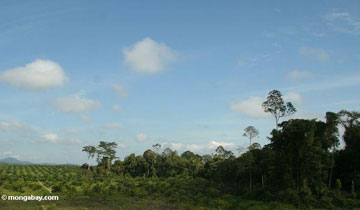Biofuels could damage environment, stymie development, says report
Rhett A. Butler, mongabay.com
January 25, 2007
|
|
In his State of the Union Address Tuesday night, U.S. President George W. Bush highlighted ethanol fuel production as a means to improve domestic security by reducing dependence on foreign oil while at the same time helping to fight global warming. His call echoes a broader shift in sentiment among business and political leaders who believe that biofuels — liquid fuels produced ‘energy crops’ including sugarcane, corn, soybeans, oil palms — are a key future liquid energy source. In fact, next week, biofuels are likely to take a prominent position at the European Union’s ‘Sustainable Energy Week’ in Brussels when 650 delegates will listen to speeches by the likes of Al Gore and UK foreign minister Margaret Beckett.
With all the enthusiasm it may seem that biofuels are the end-all solution. A new report argues that this is not the case. In its briefing, “International trade in biofuels: Good for development? And good for environment?” the International Institute for Environment and Development (IIED) cautions policymakers not to get caught up in all the hype. IIED warns that serious concerns still remain when it comes to the widespread adoption of these renewable energy sources.
 Swamp forest that has been drained and cleared in Kalimantan (Indonesian Borneo). This area will soon be planted with oil palm plantations. Globally, growing demand for biofuels is driving deforestation from Borneo to the Amazon (for soybeans and sugarcane). Rising demand has driven world sugar prices to a 25-year high. |
“The global biofuels market offers important opportunities to bring together the economic, environmental and social agendas both in developing countries and globally,” writes Annie Dufey, author of the report. “However, a lack of coherence and coordination between the stakeholders and policy agendas involved at the interface between biofuels, trade and sustainable development could lead to biofuels providing a solution to one specific problem while simultaneously creating several others. It is therefore increasingly urgent to map a path for the global biofuels industry that supports sustainable development. Analysis is needed to integrate the above issues and to deliver concrete and timely recommendations to policy makers that will drive the sustainable development results of this new market.”
Dufey goes on to argue that international trade barriers, especially tariffs and subsidies, need to be relaxed to enable the developing world to reap the benefits of the emerging
biofuels trade, while certification schemes need to be established to take account of the environmental and social conditions in such countries. She cites poor working conditions associated with the cultivation of some energy crops, especially sugarcane and palm oil), and says that large-scale biofuel production could well have serious environmental consequences as native ecosystems are replaced by the likes of soybeans, oil palm and sugarcane.
“The cultivation of energy crops may also trigger — or exacerbate — several of the environmental problems associated with agricultural commodity production such as deforestation, monocropping, water usage, land degradation and water pollution. Of these, the expansion of the agricultural frontier is a key concern, and especially the impacts this may have on tropical forests, savannahs and biodiversity,” she writes. “Forests have been cleared for palm oil production in countries such as Indonesia and Malaysia. If the increased demand for biofuel were met by expansion of soy production, this would imply further environmental pressure in the sensitive drier savannah areas of north-central Brazil (the cerrado) and in the Amazon forests… Development benefits could also be lost if the choice of crop leads to competition for water resources or for land used to grow food crops.”
While these are concerns, Dufey notes that are potential environmental upsides to biofuels beyond reduced emissions of greenhouse gases. Bioenergy crops can be planted to highly degraded lands, promoting land restoration by improving soils and anchoring against soil erosion.
 Oil palm on the edge of a forest in Malaysia. “The rapid development of biofuels has largely been driven by the promise of reduced greenhouse gas emissions, yet environmental benefits could be lost if the sector’s expansion leads to further deforestation,” writes Annie Dufey, author of the report. “Development benefits could also be lost if the choice of crop leads to competition for water resources or for land used to grow food crops.” |
“Crops such as Jatropha, due to their fast growth, drought resistant nature and soil-improving properties, have the potential to extend the land base available for agricultural activities and to create new markets for farmers in marginal areas — as well as providing local biofuels through simple processing plants,” she adds.
“Biofuels can help tackle climate change and improve livelihoods in developing countries, as well as provide a source of economic growth and energy,” says Dufey. “But to achieve this, all players in the sector urgently need to be aware of the trade-offs and take steps to address them.”
“The novelty of biofuels, the vast array of issues involved and the lack of knowledge to tackle many of them, together with diverging political and business interests mean that consensus is elusive,” she adds. “It is therefore increasingly urgent to map a path for the global biofuels industry that supports sustainable development.”
Dufey’s report for the IIED is available at iied.org
Related articles
China invests in $5.5B biofuels project in Borneo, New Guinea — 1/18/2007
China has agreed to invest in a $5.5 billion biofuels project on the islands of New Guinea and Borneo. The plan promises to be controversial among environmentalists who say that it will destroy some of the world’s most biodiverse — and threatened — ecosystems on the planet.
Biofuels can lead to deforestation says Unilever executive — 8/11/2006
While biofuels are hyped for their potential to off-set fossil fuel use, the shift toward their use should proceed with caution warns Alan Jope, vice president of consumer products giant Unilever. In an August 7 interview with The Times, Jope said that the environmental drawbacks of biofuels is overlooked.
Cellulosic ethanol fuels environmental concerns — 8/6/2006
In recent months, high fuel prices and national security concerns have sparked interest in biofuels. Cellulosic ethanol, which can be derived from virtually any plant matter including farm waste, looks particularly promising. The U.S. Department of Energy projects that cellulosic conversion technology could reduce the cost of producing ethanol by as much as 60 cents per gallon by 2015. Green groups see cellulosic ethanol as a carbon neutral energy source that could be used to fight the build up of atmospheric carbon dioxide responsible for global warming.
High oil prices fuel bioenergy push — 5/9/2006
High oil prices and growing concerns over climate change are driving investment and innovation in the biofuels sector as countries and industry increasingly look towards renewable bioenergy to replace fossil fuels. Bill Gates, the world’s richest man, has recently invested $84 million in an American ethanol company while global energy gluttons ranging from the United States to China are setting long-term targets for the switch to such fuels which potentially offer a secure domestic source of renewable energy and fewer environmental headaches. Biofuels are fuels that are derived from biomass, including recently living organisms like plants or their metabolic byproducts like cow manure. Unlike fossil fuels — like coal, petroleum, and natural gas, which are finite resources — biofuels are a renewable source of energy that can be replenished on an ongoing basis. In general, biofuels are biodegradable and, when burned, have fewer emissions than traditional hydrocarbon-based fuels. Typically, biofuels are blended with traditional petroleum-based fuels, though it is possible to run existing diesel, engines purely on biodiesel, something which holds a great deal of promise as an alternative energy source to replace fossil fuels. Further, because biofuels are generally derived from plants which absorb carbon from the atmosphere as they grow, biofuel production offers the potential to help offset carbon dioxide emissions and mitigate climate change.
Why is oil palm replacing tropical rainforests? — 4/25/2006
Recently much has been made about the conversion of Asia’s biodiverse rainforests for oil-palm cultivation. Environmental organizations have warned that by eating foods that use palm oil as an ingredient, Western consumers are directly fueling the destruction of orangutan habitat and sensitive ecosystems. So, why is it that oil-palm plantations now cover millions of hectares across Malaysia, Indonesia, and Thailand? Why has oil palm become the world’s number one fruit crop, trouncing its nearest competitor, the humble banana?